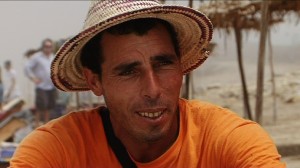- New slate includes films from Egypt, Morocco, Lebanon, Palestine, Jordan
- Enjaaz supports 22 features, documentaries in three years
 Enjaaz, the post-production fund of the Dubai International Film Festival’s Dubai Film Market, today provided a first look at 12 of the most promising upcoming films from the Arab world and Arab filmmakers. The announcement coincides with the debut of another Enjaaz film, Habibi Rasak Kharban, at the 36th Toronto International Film Festival.
Enjaaz, the post-production fund of the Dubai International Film Festival’s Dubai Film Market, today provided a first look at 12 of the most promising upcoming films from the Arab world and Arab filmmakers. The announcement coincides with the debut of another Enjaaz film, Habibi Rasak Kharban, at the 36th Toronto International Film Festival.
The 12 titles, which include features and documentaries from Egypt, Morocco, Lebanon, Palestine and Jordan, have been shortlisted from more than 110 entries received from more than 17 countries. The post-production fund selects up to 15 films in production annually to receive up to US$100,000 each to help Arab and Arab-origin filmmakers bridge the gap between production and a screen-ready product.
The shortlist includes experienced and award-winning directors as well as first-time helmers:
* Beirut Hotel, a high-wire drama that follows a short-lived romance between a young Lebanese singer trying to escape her controlling husband and an NGO staffer who is about to be accused of spying. The France-Lebanon fiction feature is directed by Danielle Arbid (In the Battlefields, A Lost Man).
* Che Guevara Died in Lebanon, a personal documentary from Lebanon about a former commander of the Lebanese civil war who transforms into a peace activist. The film is directed by Christina Foerch Saab.
* Confession and Struggle, a documentary by Eliane Raheb, which explores the Lebanese civil war from the points of view of two radically different people: the first, the ex-leader of a major Christian militia who now seeks forgiveness and redemption; the second, a 60-year-old Shia woman struggling to find information about her son who disappeared during the war and potentially at the hands of the former.
* Doaa… Aziza, Egyptian director Saad Hendawy’s documentary that questions whether the grass really is greener on the other side. Hendawy’s film follows two young women – an Egyptian raised in France but conflicted about her identity who decides to relocate to Egypt, and another from Egypt who decides to fix her sense of alienation by moving to France.
* Gate No. 5, the second documentary from award-winning Lebanese director Simon El-Habre (The One Man Village). The film follows four truck drivers whose lives revolve around waiting at the city’s port, itself closely intertwined with Lebanon’s history.
 * Hercule vs. Hermes, a France-Morocco documentary from Mohamed Ulad, which traces the Homeric battle between a Moroccan peasant nicknamed Hercule and a wealthy French corporate heir who uses all possible tactics to get the family to quit their plot of land on one of the most beautiful beaches in northern Morocco.
* Hercule vs. Hermes, a France-Morocco documentary from Mohamed Ulad, which traces the Homeric battle between a Moroccan peasant nicknamed Hercule and a wealthy French corporate heir who uses all possible tactics to get the family to quit their plot of land on one of the most beautiful beaches in northern Morocco.
* L’Amante du Rif (The Rif Lover) from Moroccan director, writer and producer Narjiss Nejjar. The fiction feature is inspired by a true story about a 20-year-old girl jailed for 10 years for being the lover of a drug baron.
* Sector Zero, the directorial debut from Nadim Mishlawi, a documentary about the derelict area of Karantina on the outskirts of Beirut, its peculiar history and its reflection of Lebanon’s troubled past.
* The Last Friday, from Jordan’s Yahya AlAbdallah, a fiction feature about a 40-year old divorced father who is forced to resort to a solution he’s desperately trying to avoid when faced with a medical emergency.
* The Invisible Policeman, a fiction feature directed, written and produced by Palestinian director Laith Al-Juneidi. The film follows Abu Sa’ed, a Hebron policeman and father of nine living in the old city that is entirely outside of his control, as he tries to find the funds to bail his teenage son from jail.
* Uncle Nashaat, the documentary debut from Jordanian-Palestinian filmmaker Aseel Mansour. The film chronicles the director’s search for the truth behind the death of his uncle, a Palestinian fighter believed killed by the Israelis in 1982, and the impact of his discoveries within the family.
* Yamo (Mum), by Lebanese documentary filmmaker Rami Nihawi, an effort at self-discovery through an examination of the director’s mother as she works 21 hours in four jobs daily and endures past the pain of a life filled with a broken marriage and a past carved by civil war.
Launched in 2009, the Festival’s Enjaaz programme has supported more than 20 Arab and Arab-origin films including Egyptian inner city drama Cairo Exit, UAE heritage biopic Hamama, Iraqi feature Leaving Baghdad, and Susan Youssef’s romantic interlude Habibi Rasak Kharban (Darling, There’s Something Wrong With Your Head), which made its world premiere earlier this month at the Venice International Film Festival and is making its North American premiere at the Toronto festival.
Speaking on the sidelines of the Toronto event, DIFF Managing Director Shivani Pandya said the injection of funds at a critical juncture is one element in the Festival’s multi-faceted approach to building and championing a sustainable Arab film industry at home and abroad. Enjaaz, she explained, is the penultimate element of the Dubai Film Market, which offers script to screen support for filmmakers from the Arab world or of Arab origin around the world.
“When global events like the Toronto, Venice, Cannes and Berlin film festivals pay increasing attention to the Middle East and its cinema, it makes all the work we put into talent development, mentoring, co-production, post-production and trade and acquisitions worthwhile,” Pandya said. “We are very proud of the many DIFF alumni who are taking centre stage at TIFF and festivals around the world.”
The Enjaaz programme works via two funding cycles, with deadlines in February and August every year. The second 2011 shortlist will be announced during the eighth edition of the Dubai International Film Festival, which runs December 7 to 14, 2011.
DIFF is held in association with Dubai Studio City. Dubai Duty Free, Dubai International Financial Centre, Dubai Pearl, Emirates Airline and Madinat Jumeirah, the home of the Dubai International Film Festival, are the principal sponsors of DIFF. The Festival is supported by the Dubai Culture & Arts Authority.



































